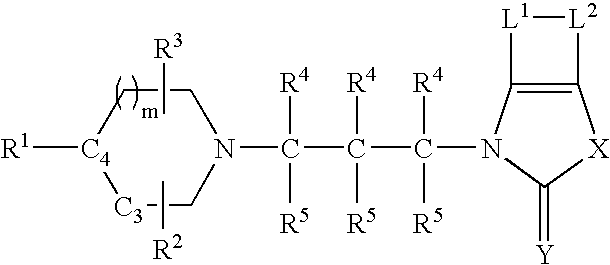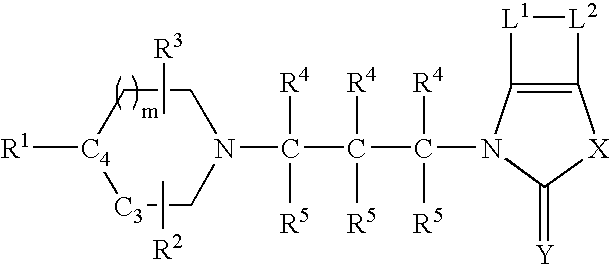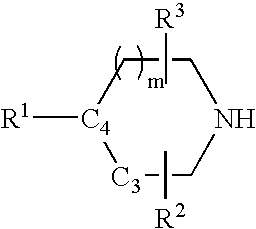Tetrahydroquinoline analogues as muscarinic agonists
a technology of tetrahydroquinoline and muscarinic receptor, which is applied in the field of compounds, can solve the problems of frequent cholinergic side effects, significant hepatotoxicity, and inability to augment the central cholinergic function through the administration of choline or phosphatidylcholine, and achieve the effect of increasing intraocular pressur
- Summary
- Abstract
- Description
- Claims
- Application Information
AI Technical Summary
Benefits of technology
Problems solved by technology
Method used
Image
Examples
example 1
Additional Synthetic Chemistry
General Analytical LC-MS Procedure
Procedure 1:
[0522] Spectra were obtained using a HP 1100 LC / MSD-instrument. A set-up with a binary pump, auto sampler, column oven, diode array detector, and electro spray ionisation interface was used. A reversed phase column (C18 Luna 3μ, 75×4.6 mm ID) with a guard column cartridge system was used. The mobile phase was MeCN / 8 mM aqueous ammonium acetate. A 15-minute gradient program was used, starting at 70% MeCN over 12 minutes to 95% MeCN, over 1 minute to 70% MeCN, hold for 2 minutes. The flow rate was 0.6 ml / min.
Procedure 2:
[0523] Spectra were obtained using a Waters LC / ZMD-instrument. A set-up with a 600 gradient pump, 2700 sample manager, 996 diode array detector, and electro spray ionisation interface was used. A reversed phase column (C18 X-Terra 5μ, 50×4.6 mm ID) with a guard column cartridge system was used. The mobile phase was MeCN / 10 mM aqueous ammonium acetate. A 14-minute gradient program was u...
example 3
Pharmacological Data
[0660] Receptor Selection and Amplification (R-SAT) assays were carried out using the cloned M1-M5 receptors essentially as described in: Brauner-Osborne H, Brann M R. Pharmacology of muscarinic acetylcholine receptor subtypes (m1-m5): high throughput assays in mammalian cells. Eur J Pharmacol Jan. 4, 1996;295(1):93-102, and Spalding T A, Trotter C, Skjaerbaek N, Messier T L, Currier E A, Burstein E S, Li D, Hacksell U, Brann M R. Discovery of an ectopic activation site on the M(1) muscarinic receptor. Mol Pharmacol. 2002 June;61(6):1297-302.
PUM
 Login to View More
Login to View More Abstract
Description
Claims
Application Information
 Login to View More
Login to View More - R&D
- Intellectual Property
- Life Sciences
- Materials
- Tech Scout
- Unparalleled Data Quality
- Higher Quality Content
- 60% Fewer Hallucinations
Browse by: Latest US Patents, China's latest patents, Technical Efficacy Thesaurus, Application Domain, Technology Topic, Popular Technical Reports.
© 2025 PatSnap. All rights reserved.Legal|Privacy policy|Modern Slavery Act Transparency Statement|Sitemap|About US| Contact US: help@patsnap.com



